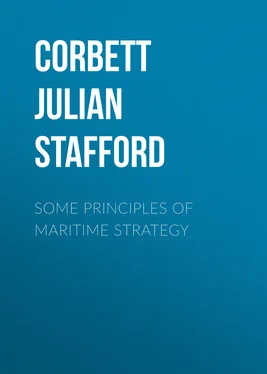Julian Corbett - Some Principles of Maritime Strategy
Здесь есть возможность читать онлайн «Julian Corbett - Some Principles of Maritime Strategy» — ознакомительный отрывок электронной книги совершенно бесплатно, а после прочтения отрывка купить полную версию. В некоторых случаях можно слушать аудио, скачать через торрент в формате fb2 и присутствует краткое содержание. Жанр: military_special, Прочая научная литература, История, foreign_edu, на английском языке. Описание произведения, (предисловие) а так же отзывы посетителей доступны на портале библиотеки ЛибКат.
- Название:Some Principles of Maritime Strategy
- Автор:
- Жанр:
- Год:неизвестен
- ISBN:нет данных
- Рейтинг книги:5 / 5. Голосов: 1
-
Избранное:Добавить в избранное
- Отзывы:
-
Ваша оценка:
- 100
- 1
- 2
- 3
- 4
- 5
Some Principles of Maritime Strategy: краткое содержание, описание и аннотация
Предлагаем к чтению аннотацию, описание, краткое содержание или предисловие (зависит от того, что написал сам автор книги «Some Principles of Maritime Strategy»). Если вы не нашли необходимую информацию о книге — напишите в комментариях, мы постараемся отыскать её.
Some Principles of Maritime Strategy — читать онлайн ознакомительный отрывок
Ниже представлен текст книги, разбитый по страницам. Система сохранения места последней прочитанной страницы, позволяет с удобством читать онлайн бесплатно книгу «Some Principles of Maritime Strategy», без необходимости каждый раз заново искать на чём Вы остановились. Поставьте закладку, и сможете в любой момент перейти на страницу, на которой закончили чтение.
Интервал:
Закладка:
From these considerations it will appear that, real and logical as the classification is, to give it the designation "offensive and defensive" is objectionable from every point of view. To begin with, it does not emphasise what the real and logical distinction is. It suggests that the basis of the classification is not so much a difference of object as a difference in the means employed to achieve the object. Consequently we find ourselves continually struggling with the false assumption that positive war means using attack, and negative war being content with defence.
That is confusing enough, but a second objection to the designation is far more serious and more fertile of error. For the classification "offensive and defensive" implies that offensive and defensive are mutually exclusive ideas, whereas the truth is, and it is a fundamental truth of war, that they are mutually complementary. All war and every form of it must be both offensive and defensive. No matter how clear our positive aim nor how high our offensive spirit, we cannot develop an aggressive line of strategy to the full without the support of the defensive on all but the main lines of operation. In tactics it is the same. The most convinced devotee of attack admits the spade as well as the rifle. And even when it comes to men and material, we know that without a certain amount of protection neither ships, guns, nor men can develop their utmost energy and endurance in striking power. There is never, in fact, a clean choice between attack and defence. In aggressive operations the question always is, how far must defence enter into the methods we employ in order to enable us to do the utmost within our resources to break or paralyse the strength of the enemy. So also with defence. Even in its most legitimate use, it must always be supplemented by attack. Even behind the walls of a fortress men know that sooner or later the place must fall unless by counter-attack on the enemy's siege works or communications they can cripple his power of attack.
It would seem, therefore, that it were better to lay aside the designation "offensive and defensive" altogether and substitute the terms "positive and negative." But here again we are confronted with a difficulty. There have been many wars in which positive methods have been used all through to secure a negative end, and such wars will not sit easily in either class. For instance, in the War of Spanish Succession our object was mainly to prevent the Mediterranean becoming a French lake by the union of the French and Spanish crowns, but the method by which we succeeded in achieving our end was to seize the naval positions of Gibraltar and Minorca, and so in practice our method was positive. Again, in the late Russo-Japanese War the main object of Japan was to prevent Korea being absorbed by Russia. That aim was preventive and negative. But the only effective way of securing her aim was to take Korea herself, and so for her the war was in practice positive.
On the other hand, we cannot shut our eyes to the fact that in the majority of wars the side with the positive object has acted generally on the offensive and the other generally on the defensive. Unpractical therefore as the distinction seems to be, it is impossible to dismiss it without inquiring why this was so, and it is in this inquiry that the practical results of the classification will be found to lie—that is, it forces us to analyse the comparative advantages of offence and defence. A clear apprehension of their relative possibilities is the corner stone of strategical study.
Now the advantages of the offensive are patent and admitted. It is only the offensive that can produce positive results, while the strength and energy which are born of the moral stimulation of attack are of a practical value that outweighs almost every other consideration. Every man of spirit would desire to use the offensive whether his object were positive or negative, and yet there are a number of cases in which some of the most energetic masters of war have chosen the defensive, and chosen with success. They have chosen it when they have found themselves inferior in physical force to their enemy, and when they believed that no amount of aggressive spirit could redress that inferiority.
Obviously, then, for all the inferiority of the defensive as a drastic form of war it must have some inherent advantage which the offensive does not enjoy. In war we adopt every method for which we have sufficient strength. If, then, we adopt the less desirable method of defence, it must be either that we have not sufficient strength for offence, or that the defence gives us some special strength for the attainment of our object.
What, then, are these elements of strength? It is very necessary to inquire, not only that we may know that if for a time we are forced back upon the defensive all is not lost, but also that we may judge with how much daring we should push our offensive to prevent the enemy securing the advantages of defence.
As a general principle we all know that possession is nine points of the law. It is easier to keep money in our pocket than to take it from another man's. If one man would rob another he must be the stronger or better armed unless he can do it by dexterity or stealth, and there lies one of the advantages of offence. The side which takes the initiative has usually the better chance of securing advantage by dexterity or stealth. But it is not always so. If either by land or sea we can take a defensive position so good that it cannot be turned and must be broken down before our enemy can reach his objective, then the advantage of dexterity and stealth passes to us. We choose our own ground for the trial of strength. We are hidden on familiar ground; he is exposed on ground that is less familiar. We can lay traps and prepare surprises by counter-attack, when he is most dangerously exposed. Hence the paradoxical doctrine that where defence is sound and well designed the advantage of surprise is against the attack.
It will be seen therefore that whatever advantages lie in defence they depend on the preservation of the offensive spirit. Its essence is the counter-attack—waiting deliberately for a chance to strike—not cowering in inactivity. Defence is a condition of restrained activity—not a mere condition of rest. Its real weakness is that if unduly prolonged it tends to deaden the spirit of offence. This is a truth so vital that some authorities in their eagerness to enforce it have travestied it into the misleading maxim, "That attack is the best defence." Hence again an amateurish notion that defence is always stupid or pusillanimous, leading always to defeat, and that what is called "the military spirit" means nothing but taking the offensive. Nothing is further from the teaching or the practice of the best masters. Like Wellington at Torres Vedras, they all at times used the defensive till the elements of strength inherent in that form of war, as opposed to the exhausting strain inherent in the form that they had fixed upon their opponents, lifted them to a position where they in their turn were relatively strong enough to use the more exhausting form.
The confusion of thought which has led to the misconceptions about defence as a method of war is due to several obvious causes. Counter-attacks from a general defensive attitude have been regarded as a true offensive, as, for instance, in Frederick the Great's best-known operations, or in Admiral Tegetthoff's brilliant counterstroke at Lissa, or our own operations against the Spanish Armada. Again, the defensive has acquired an ill name by its being confused with a wrongly arrested offensive, where the superior Power with the positive object lacked the spirit to use his material superiority with sufficient activity and perseverance. Against such a Power an inferior enemy can always redress his inferiority by passing to a bold and quick offensive, thus acquiring a momentum both moral and physical which more than compensates his lack of weight. The defensive has also failed by the choice of a bad position which the enemy was able to turn or avoid. A defensive attitude is nothing at all, its elements of strength entirely disappear, unless it is such that the enemy must break it down by force before he can reach his ultimate objective. Even more often has it failed when the belligerent adopting it, finding he has no available defensive position which will bar the enemy's progress, attempts to guard every possible line of attack. The result is of course that by attenuating his force he only accentuates his inferiority.
Читать дальшеИнтервал:
Закладка:
Похожие книги на «Some Principles of Maritime Strategy»
Представляем Вашему вниманию похожие книги на «Some Principles of Maritime Strategy» списком для выбора. Мы отобрали схожую по названию и смыслу литературу в надежде предоставить читателям больше вариантов отыскать новые, интересные, ещё непрочитанные произведения.
Обсуждение, отзывы о книге «Some Principles of Maritime Strategy» и просто собственные мнения читателей. Оставьте ваши комментарии, напишите, что Вы думаете о произведении, его смысле или главных героях. Укажите что конкретно понравилось, а что нет, и почему Вы так считаете.












